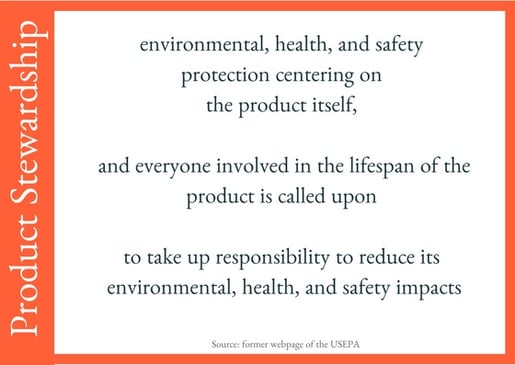Effective product stewardship requires being proactive to your channel customers’ and end-users’ needs, while engaging with your supply chain to reduce impacts to human health and the environment. Below we highlight 7 steps to future-proofing product stewardship. Understand why it's worth the effort and how to succeed.
1. Understand the Opportunity. Consumer groups will continue to lobby at the state and federal level to ban chemicals shown to be hazardous to human health and/or the environment. Whether you're motivated by emerging business requirements, investor's expectations of transparency or the desire to design better products, there is an opportunity to be innovative, understand your substances, and future-proof your products.

Definition of Product Stewardship, from a former webpage of the US EPA
2. Embrace the Circular Economy. What is the mission of the ‘circular’ economy? One in which raw materials are reused in a way to create cleaner products with less waste, and financial benefits for companies willing to transform. It eliminates or greatly reduces the need for new raw materials.
At the end-of-life of your products, ideally, they can be recycled, repurposed or reused in some fashion to create something new, instead of clogging up our landfills (the end of a linear economy). The image below visualizes the differences between a linear, reuse and circular economy.

From a Linear to a Circular Economy, Government of the Netherlands; https://www.government.nl/topics/circular-economy/from-a-linear-to-a-circular-economy
3. Understand your raw materials. Chemicals transparency is an emerging trend being pushed by NGOs, state legislation and many large retailers (see list in #4, below). With multiple product lines and tiers of suppliers, we realize that details can get lost or miscommunicated. We started Toxnot to help manufacturers understand what is in their products because, after dozens of conversations, we realized they didn’t know. To reduce your regulatory risks, to win the approval of ever-more discerning customers and to be a proactive participant in the circular economy, it’s imperative to know more about which substances you’re using.
No comments:
Post a Comment